This form of gardening establishes a direct connection with nature within the imposing walls of large cities
When he puts down his brushes, tired of redefining the rugged and lush contours of Haitian nature, Pascal Nerisier tends to his garden right in the upscale commune of Pétion-Ville.
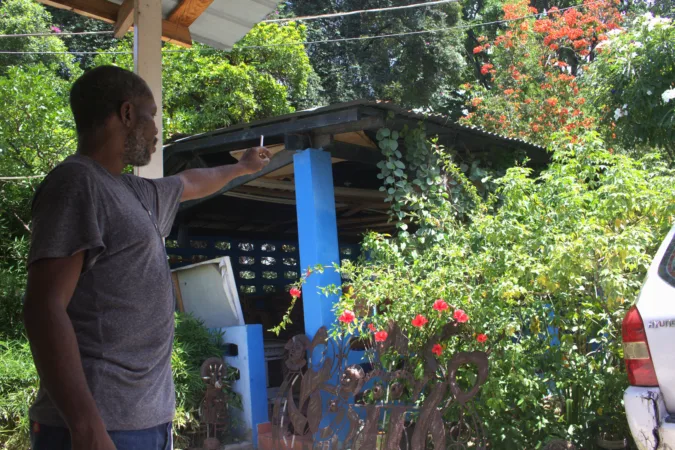
Pascal Nerisier (Paskö) presents his home garden in Pétion-Ville in September 2023.| © Jean Feguens Regala/AyiboPost
On a small plot about 26 meters long and 6 meters wide, the painter and illustrator, known as Paskö, grows a variety of vegetables, green citrus, squash, fruit trees and shrubs, sweet potatoes, medicinal plants, and aromatic herbs for his consumption.
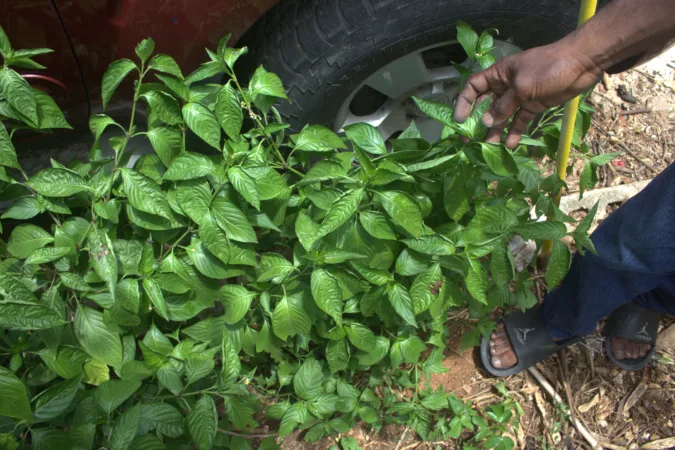
Medicinal plants in Pascal Nerisier’s (Paskö) courtyard in Pétion-Ville. | © Jean Feguens Regala/AyiboPost
This form of gardening is gaining followers in several major cities in Haiti, in a context where the National Food Security Coordination (CNSA) reports that half of the country is affected by food insecurity.
The practice, which requires minimal space, is called « urban agriculture, » according to agronomist Jean-Luc Saint-Pierre, program coordinator at the Promotion for Development (PROMODEV).
According to the professional, this form of agriculture aims at sustainable development. It has become widespread worldwide with the increasing urbanization of cities, and in Haiti, « it gained momentum starting in the 1980s, » he adds.
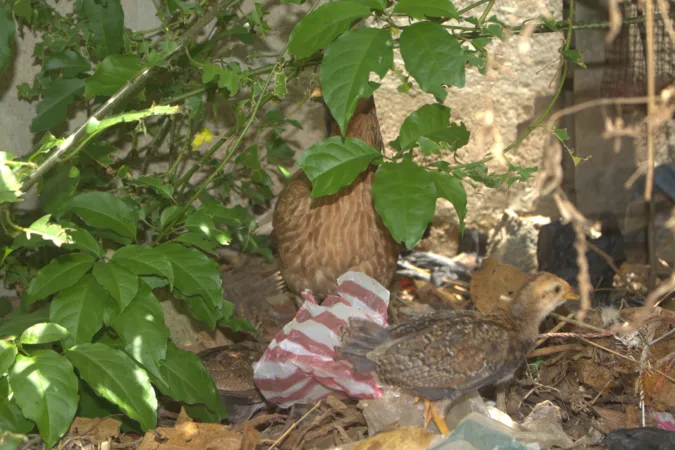
A hen and her chicks in Pascal Nerisier’s (Paskö) courtyard in Pétion-Ville. | © Jean Feguens Regala/AyiboPost
Each urban farmer has their own story.
In Paskö’s courtyard in Pétion-Ville, rabbits purr amidst the clucking of chickens. It’s a familiar world for the artist, who has been practicing agriculture in his courtyard in Pétion-Ville for nearly five years. This passion followed him during his ten years in France, and he enthusiastically resumed it around three years after his return to Haiti in 2014.
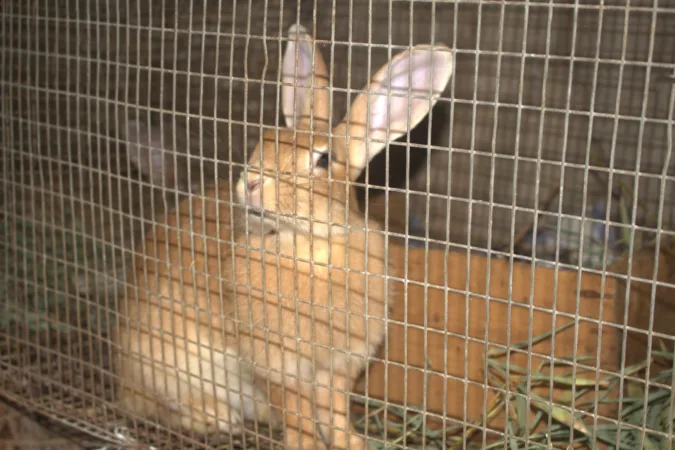
A rabbit raised by Pascal Nerisier, nicknamed Paskö, in his house in Pétion-Ville. | © Jean Feguens Regala/AyiboPost
Agronomist Arlan Lecorps got involved in urban farming through his profession. Urban agriculture was « recommended » by food organizations following the January 12, 2010 earthquake in Haiti « in order to free people in displacement camps from their dependence on foreign humanitarian aid, » Lecorps reminds AyiboPost.
Two years ago, the professional created his own urban garden on the roof of his house in Delmas. He used about twenty car tires filled with soil and compost to cultivate sweet potatoes, fruit trees, various vegetables, and aromatic plants. « It’s a way for me to occupy myself during my free time, » Lecorps maintains.
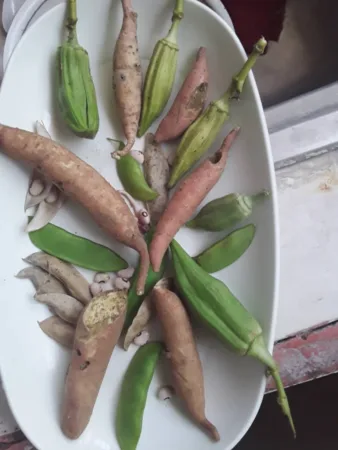
Harvest of callaloo, peas, and sweet potatoes in the urban garden of agronomist Arlan Lecorps in Delmas. | Photo (c) : Arlan Lecorps
According to the agronomist, gardening has therapeutic benefits.
« Gardening requires physical effort that is beneficial for health, » explains Lecorps. « And mentally, we get satisfied by having accomplished something, » he adds.
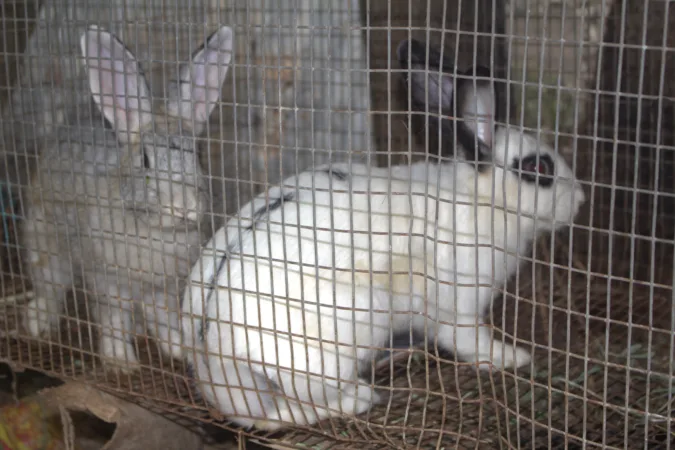
Two rabbits raised by Pascal Nerisier, nicknamed Paskö, in his house in Pétion-Ville. | © Jean Feguens Regala/AyiboPost
In September 2023, the majority of the Haitian population faces acute food insecurity. In this context, growing food at home can be helpful.
This is one of the arguments raised by Frantz Brizard, a former sociology student at the Faculty of Human Sciences.
The native of Thomonde sees agriculture as a « weapon against food insecurity and Haiti’s dependence on foreign countries [for food production]. »
Watch : Vidéo : La malédiction du riz importé sur l’économie Haïtienne
The young man started his garden during the lockdown period in 2020 in Santo, in La Plaine. In his courtyard of about 150 to 200 square meters, he practices vegetable cultivation.
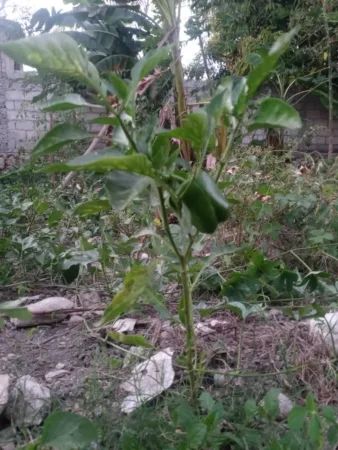
Sweet pepper in Frantz Brizard’s home garden.
According to Brizard, this covers a significant portion of his basic needs. Since it generally requires less harmful chemicals, it allows him to contribute to protecting the environment while safeguarding his health.
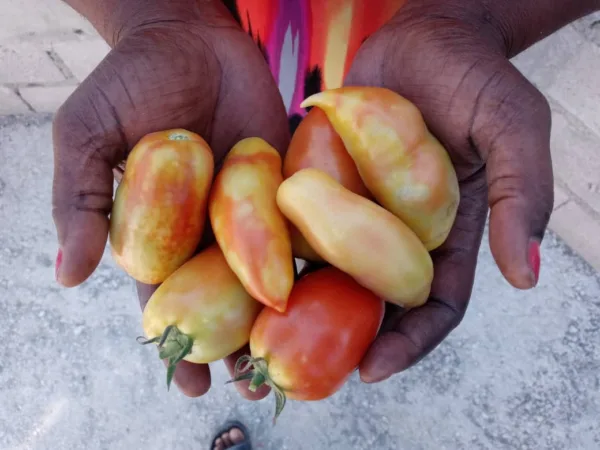
Harvest of tomatoes in Frantz Brizard’s home garden.
Cassanuela Damus is a fourth-year agronomy student. She started her garden in Clercine in 2020 to be able to practice her profession in a secure environment since the practice farm available for students at her university is located in a high-risk area for kidnapping.
Damus cultivates vegetables and produces fruit tree seedlings that she sells.
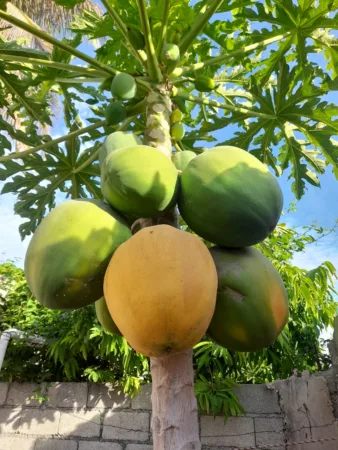
Papayas (Carica papaya) in the home garden of Cassanuela Damus in Croix-des-Missions on May 13, 2023.
« On a qualitative level, the produce from an urban garden is much healthier than that of most rural gardens, which are often exposed to various types of agrochemical residues, » Damus rejoices.
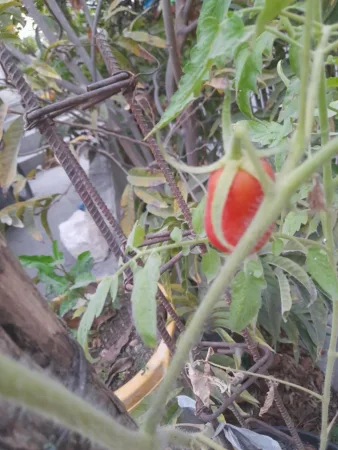
Tomatoes (Solanum lycopersicum) in Cassanuela Damus’ garden in Croix-des-Missions on February 25, 2023.
Urban agriculture establishes a direct connection with nature within the imposing walls of big cities.
James Vergneau, known as Rebel Layonn, is a singer, songwriter, and yoga teacher. He has been practicing urban agriculture for nearly eight years in Delmas 95.
Rebel Layonn produces all kinds of vegetables and fruit trees. He uses composting and organic manure.
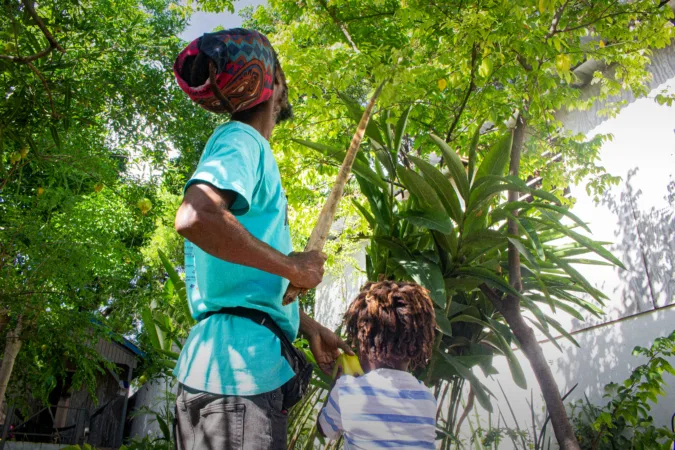
Harvesting starfruit between James Vergneau (Rebel Layonn) and his son in their home garden in June 2023. | © Jean Feguens Regala/AyiboPost
Layonn also maintains about three beehives at his home. « I generate some of my food, so I don’t depend entirely on supermarkets, » says Rebel Layonn.
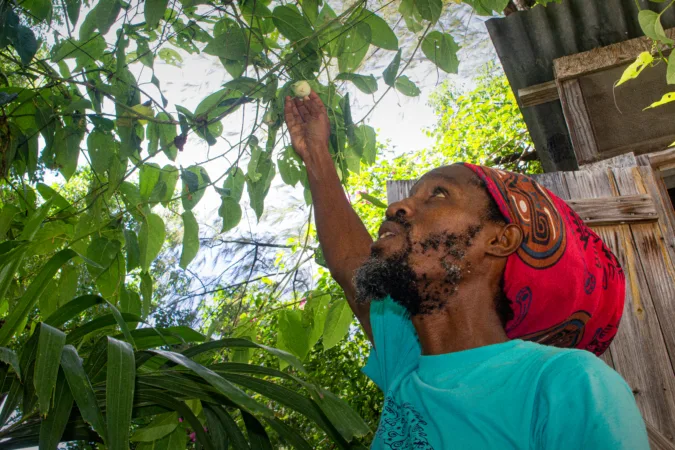
James Vergneau (Rebel Layonn) harvests gourds in his home garden in June 2023. | © Jean Feguens Regala/AyiboPost
Many urban agriculture enthusiasts emphasize ecological values by practicing recycling, notably.
Rebel Layonn practices agroforestry. He regrets that the human species « neglects its interdependence with nature. »
English translation by Sarah Jean.
Cover image : Pascal Nerisier highlights the nutritional values and fertility of soil at his home in Pétion-Ville in September 2023. | © Jean Feguens Regala/AyiboPost
Discover our special AyiboLab program conducted in June 2023 with James Vergneau, also known as Rebel Layonn, who has been a vegetarian for about 25 years :
Stay in touch with AyiboPost through :
► Our WhatsApp channel : click here
► Our WhatsApp Community : click here
► Our Telegram canal : click here



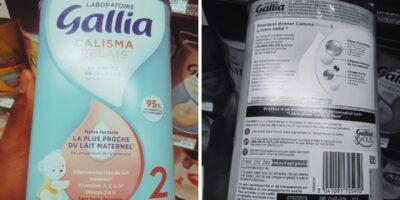



Comments